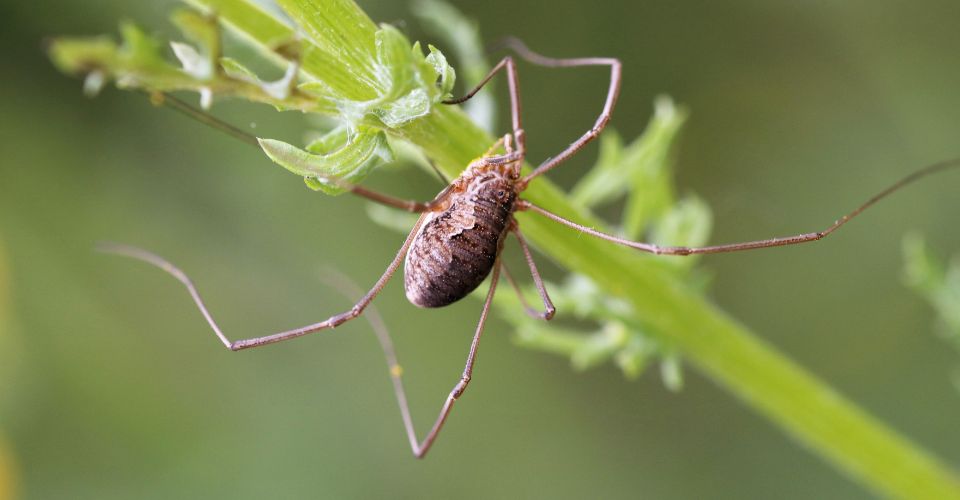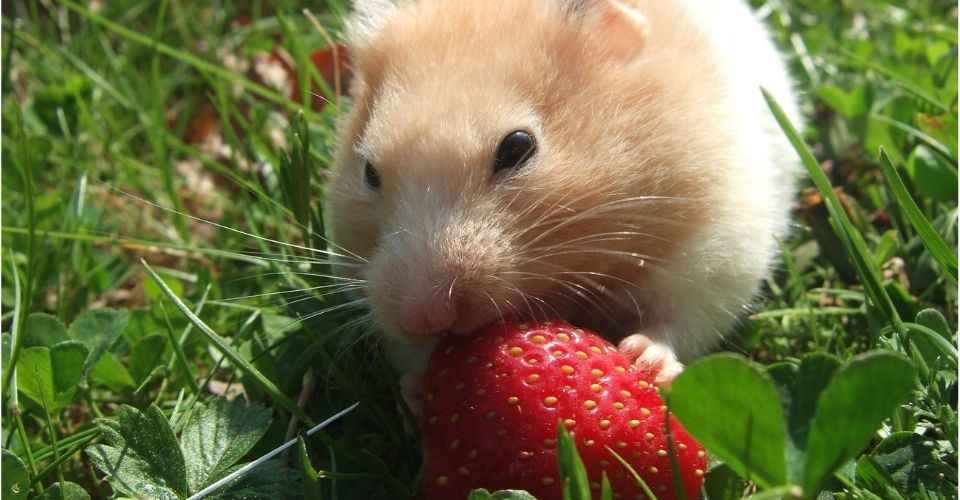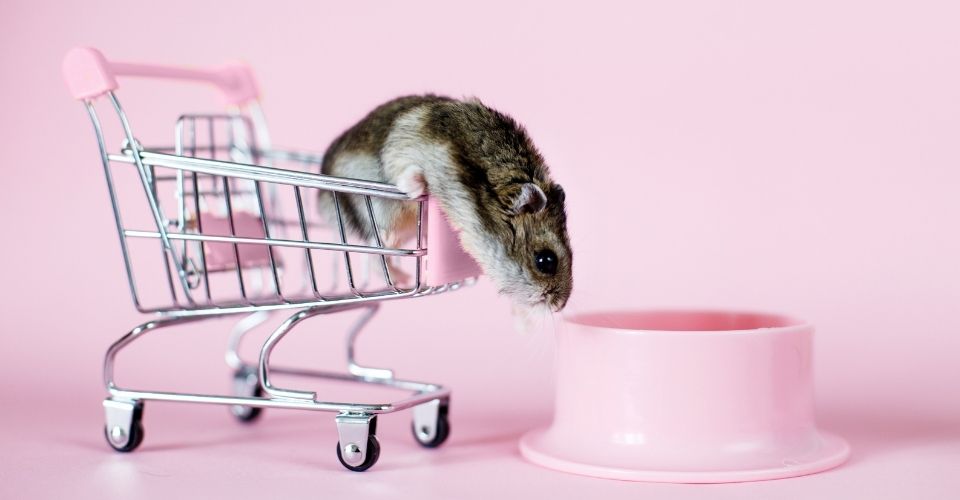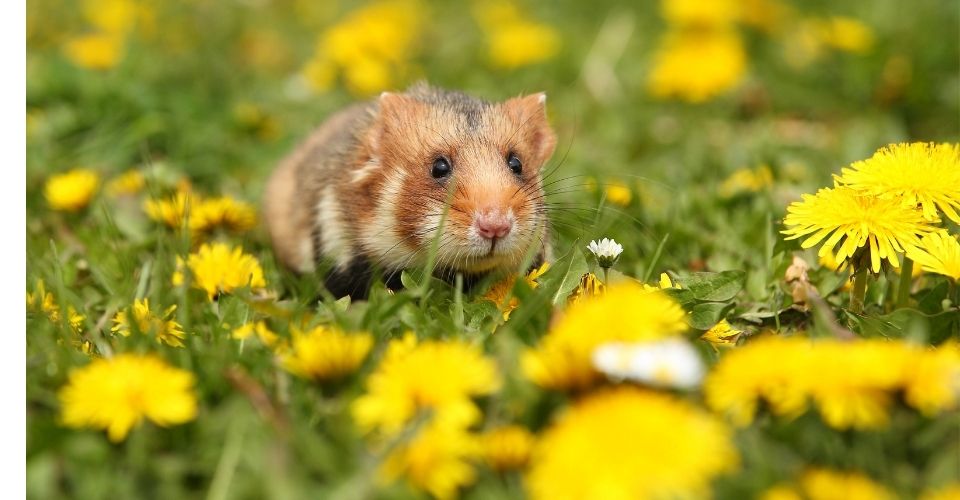We have all watched Tom & Jerry growing up, and now cheese seems to be synonymous with mice. But can hamsters eat cheese, too? Yes! Hamsters can certainly eat cheese. Hamsters are taxonomically related to mice; do they, however, share the same liking for cheese? Is it safe for hamsters to eat cheese? Let us delve deeper into the relationship between cheese and hamsters to find out answers.
With hamsters, everything is about moderation. Whether you are feeding your hamster or setting the temperature for its surroundings, you have to be careful to not overdo anything. Cheese is no different for hamsters. Cheese is rich in proteins, minerals and vitamins, and can prove to be the perfect snack for your hamster (in moderate quantities, of course).
Can Hamsters Eat Cheese?
Hamsters can eat cheese. Cheese is a dairy product that is usually sourced from cows’ or goats’ milk. Numerous types of cheese are available, varying in hardness, textures, and flavors but not all are suitable for hamsters. Cheese offers some benefits and poses some risks, too, for hamsters; thus, hamsters can only be fed certain types of cheese occasionally and that, too, moderately.
In the wild, hamsters get their protein intake through bugs and insects and have no access to cheese. But, since hamsters are known to have, and should have a protein intake, they can eat cheese.
Do Hamsters Like Cheese?
Rodents like hamsters are often depicted to be fond of cheese. In reality, hamsters in the wild live off of seeds, fruits, and bugs to satiate their hunger and get the required nutrients for their little bodies. Cheese is not something that hamsters are naturally familiar with, so it depends on individual hamsters whether they prefer to have cheese or not.
Start by treating your hamster to a sliver of cheese and observe how it responds. If your hamster shows affinity towards cheese and does not get its stomach upset, you can continue to feed it the recommended quantity. Generally, hamsters do like to nibble on cheese and seem to be quite fond of it.
Is Cheese Good For Hamsters?
Cheese is loaded with proteins, calcium, and fats; it can prove to be a fantastic source of boost for your hamster’s health. However, hamsters should only be given low-fat, non-salty cheese as they have minimal risks but can lend great support to their bones and growth.
Treating your hamster to low-fat cottage cheese can boost your hamster’s bone health because of the presence of calcium in it. If your female pet hamster is pregnant or is nursing her pups, cheese can just be the right treat for her. Even young pups of up to six months of age can show notable growth if fed cheese.
Here’s a breakdown of how different components of cheese can benefit your hamster:
- Vitamin A – boosts hamster’s immunity and wards off illnesses.
- Vitamin B – protects the hamster’s immune system and energizes them.
- Calcium – strengthens hamster’s bones.
- Protein – helps in the growth of hamsters and keeps them strong.
- Zinc – enhances hamsters’ metabolic system and aids in digestion.
Hamsters should only be given certain types of cheese as some forms of cheese can be toxic for hamsters.
Is Cheese Bad For Hamsters?
Cheese comes with both its risk and benefits. While it has several benefits for our lovable critters, cheese can also prove to be fatally toxic for hamsters. Problems can arise either due to overfeeding or feeding your hamster a type of cheese that is not suited to them.
Here are some risks that you need to be wary of before feeding cheese to your hamster:
- Choking – hamsters need to be fed according to their size; oversized cheese chunks can make them choke.
- Diabetes – cheese is rich in fat which can become a source of diabetes for hamsters.
- Obesity – cheese’s high fat content can also cause hamsters to become obese.
- Toxicity – as mentioned, some types of cheese, like blue cheese can be fatally toxic for hamsters.
Only feed the recommended types of cheese to your hamsters and those too in the prescribed amounts; this will not only keep your hamster healthy but also prevent it from contracting any health issues.
What Kind of Cheese Can Hamsters Eat?
It is estimated that there are around a thousand kinds of cheese made around the world. It would be arduous to mention every form of cheese and whether or not hamsters could have it. So, here are some indicators to help with questions like ‘what kind of cheese can hamsters eat’.
All types of cheese are highly calorific; hamsters, thus, should be fed only those forms of cheese that have a low-fat content to hamper their growth to obesity. Hamsters can safely have these types of cheese in moderate quantities:
- Ricotta
- Mild Cheddar
- Mozzarella (Low Fat)
- Cottage Cheese (Low Fat)
Cheese that has a high sodium content should also be avoided.
Cheese Hamsters Cannot Eat
Cheese that is highly saturated and full of fats should be avoided at all costs; your hamster can fall seriously ill upon eating any such cheese. Salted cheese should also be avoided being fed to your pet hamster as it contains a high amount of sodium which can be noxious for hamsters.
Hamsters should be kept away from these kinds of cheese:
- Aged Cheese – cheese grows strong with age and becomes difficult to digest for hamsters.
- Blue Cheese – this contains molds and bacteria which can harm your hamster.
- Fatty Cheese – excess fats can be a source of obesity and diabetes.
- Soft Cheese – hamsters can have trouble eating this cheese.
These are just some of the cheese that hamsters should not be fed. Additionally, hamsters should also not be given parmesan and hard cheddars.
Can Hamsters Eat Cheez-It and Cheese-Flavored Snacks?
No, hamsters should not eat Cheez-It or any other cheese-flavored snacks for that matter. These snacks are produced for humans and can cause a multitude of problems for hamsters. Hamsters can choke on these snacks. Besides the choking threat, they could also be exposed to other ingredients in the snacks that may not suit these critters.
These cheese puffs are processed with almost no nutritional value; they are also high in sodium and can cause kidney ailments as well as heart strokes for hamsters.
Feeding Cheese to Hamsters
As with every new food, only a very small quantity of cheese should be introduced to hamsters in their cages. This is the time to observe how these rodents react to cheese and can your hamster eat cheese or not.
If your hamster shows no apparent signs of trouble in swallowing and digestion, you need to wait till they defecate. Cheese can often cause hamsters to experience bloating, gas, and diarrhea. All these things add up to dehydrate the hamster which can be a serious condition.
Cheese should always be given to hamsters in very small quantities and be reserved for weekly treats only. If your hamster ignores the cheese presented to it, you should stop feeding it to your pet altogether. Otherwise, feed in small amounts since hamsters also store food in their cheek pockets.
Cheese should be cut into tiny slices to ensure smooth digestion and no risk of choking in the hamster.
What Kind of Cheese Can Dwarf Hamsters Eat?
All hamsters, including dwarf hamsters, should be kept away from high-fat, sodium-rich cheese and should be fed light cheese only. All dwarf hamsters (Chinese hamsters, Winter White Dwarf Hamsters, Campbell Dwarf Hamsters) are really small in size and should be fed cheese accordingly. The ideal cheese feeding for dwarf hamsters is around a tiny pea-sized cube every 15 days.
What Type of Cheese Can Teddy Bear Hamsters Eat?
Teddy Bear Hamsters, also known as Syrian Hamsters, are the largest breed of hamsters, so they can afford to eat just a little more cheese than dwarf hamsters. Teddy Bear Hamsters can have 1 to 2 pea-sized cubes of cheese every fortnight.
It is important to remember that cheese is not an alternative to hamsters’ staple diet and should never be fed to hamsters daily.





